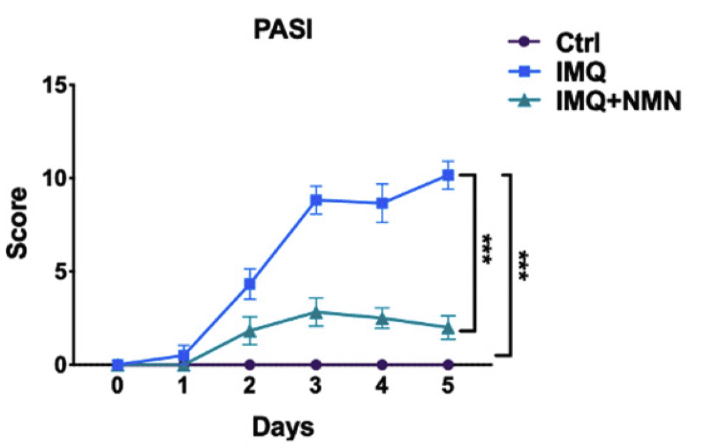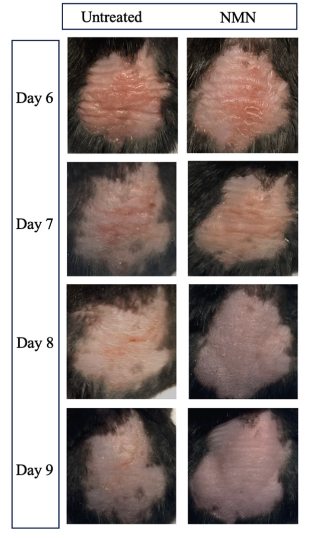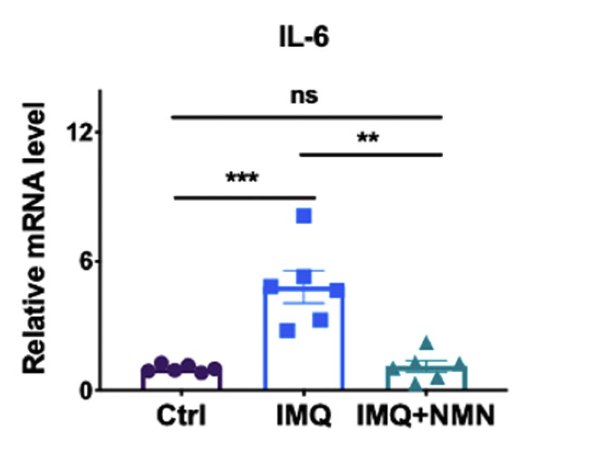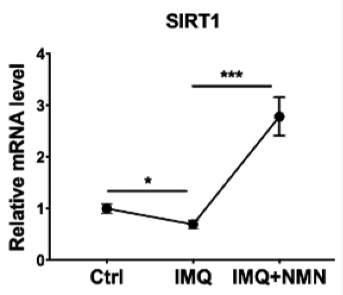This study evaluated the effects of NMN administered orally and topically on psoriasis symptoms and recovery in mice.
Key Points:
NMN showed several benefits for the skin of psoriatic mice:
- Reduced symptom severity
- Improved prognosis after onset of symptoms
- Modulated immune response and decreased oxidative stress
- Prevented decrease in SIRT1 levels
Study Evaluates NMN Treatment in Mice with Psoriasis
Two cohorts of mice were used to study the anti-inflammatory effects of NMN and the therapeutic effects of NMN.
Anti-inflammatory cohort: Mice were divided into three groups (n = 6 per group), and psoriasis-like symptoms were induced in the respective mice by applying IMQ (62.5 mg) cream daily. The groups included:
- Vehicle-treated control: Healthy mice, no NMN
- IMQ group: Psoriatic mice, no NMN
- IMQ + NMN group: Psoriatic mice, treated with NMN via oral administration (500 mg/kg) and external application (1 mM)
Therapeutic cohort: Mice were IMQ-stimulated for 5 days, and then divided into 2 groups for days 6-9 (n = 6 mice for each group):
- Untreated group: Psoriatic mice, no NMN
- NMN group: Psoriatic mice, treated with NMN via oral administration (500 mg/kg) and external application (1 mM)
Additionally, data from GEO dataset, a public functional genomics data repository, were analyzed to determine the mRNA expression levels of SIRT1 in humans with lesional skin and healthy skin.
Decreased Severity of Psoriasis Symptoms
When co-administered with IMQ (to induce psoriasis) in mice, NMN reduced the severity of symptoms:
- Psoriasis severity scores were decreased
- Redness and swelling of the skin was reduced
- Weight loss was prevented

This figure shows that mice with psoriasis (bright blue line) had significantly higher Psoriasis Severity Index Score (PASI) scores compared to healthy mice (black line). However, when mice with psoriasis were treated with NMN (light blue line), PASI scores significantly improved.
Improved Prognosis After Onset of Symptoms
“We wondered if NMN could aid the recovery process of IMQ-induced psoriatic inflammation in the skin.”
Researchers discovered that administering NMN treatment after the onset of psoriasis symptoms had positive effects.

This figure shows images of mouse skin samples following induction of psoriasis using IMQ for 5 days.
The left side shows the skin of untreated mice, where you can observe a progressive worsening of the condition from days 6 to 9. In contrast, the right side depicts the skin of mice treated with NMN from days 6 to 9, displaying less damage and a healthier appearance compared to the untreated group.
Reduced Inflammation and Oxidative Stress
Treatment with NMN protected the skin of psoriatic mice against inflammation and oxidative stress (an imbalance in harmful molecules called free radicals and protective antioxidants).
The levels of one of the measured inflammatory molecules, IL-6, is represented in the figure below.

IL-6, was significantly increased in psoriatic mice (IMQ, bright blue bar) compared to healthy mice (Ctrl, dark blue bar). Treatment with NMN suppressed the increase in IL-6 in psoriatic mice (light blue bar, IMQ+NMN).
Markers that indicate oxidative stress were also lower in psoriatic mice treated with NMN.
“The improved recovery process in mice achieved via NMN supplementation was accompanied by decreased levels of Nrf2, Ho-1, Nqo1, Sod1, and Sod2, indicating the inhibition of oxidative stress.”
NMN Prevented SIRT1 Decrease in Psoriatic Mice, Reflecting Findings in Patients
“Notably, NAD+ biosynthesis and SIRT1 together play critical roles in regulating a variety of biological processes, including metabolism, stress response, inflammation, etc..”
Using genetic information from a large database (GEO), the researchers found that the activity of SIRT1 was much lower in areas of damaged skin compared to healthy skin from individuals without skin problems.
Decreased SIRT1 levels were also observed in psoriatic mice, which was prevented by treatment with NMN.

This figure shows that SIRT1 levels were decreased in the skin of psoriatic mice (IMQ) compared to healthy mice (Ctrl). However, when psoriatic mice were treated with NMN (IMQ+NMN), the levels of SIRT1 in the skin were significantly increased.
Conclusion
Oral and topical NMN administration in mice alleviated psoriatic symptoms and modulated the immune response in mice.
NMN prevented the decrease in SIRT1, a protein important for cellular health, in the skin of psoriatic mice.
“We demonstrated that NMN could ameliorate psoriasis-like symptoms and inflammation in an IMQ-stimulated mouse model and improve therapeutic prognoses by activating the SIRT1 pathway.”
